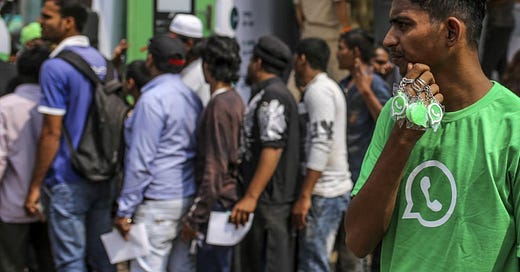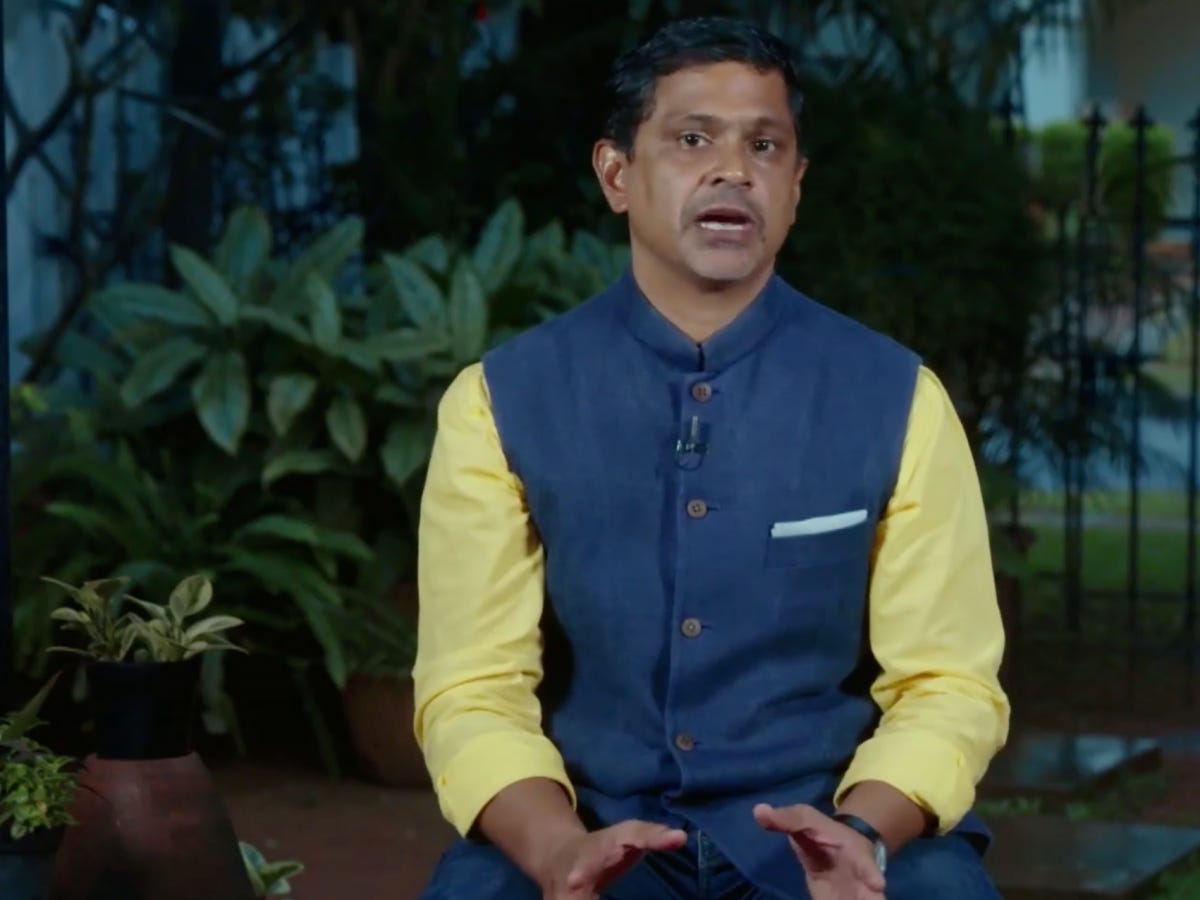Why is WhatsApp focussing on rural and undeserved segments of India?
WhatsApp has finally launched WhatsApp Pay, Shopping and enabling micro pension and insurance schemes
Abhijit Bose, Director Of Business Development at WhatsApp said at Facebook’s Fuel for India 2020: “For the majority of us, WhatsApp is the last screen we fall asleep to and the first screen we wake up to.”
India is WhatsApp’s biggest market with 400 million users.
So you can understand the underline confidence of Abhijit. Keep in mind that the 400 million number is a year old data. The numbers might have substantially increased this year. Since the time spent by Indians on smartphones(Android) has increased by 24% according to App Annie data.
Every story has two sides.
At one end WhatsApp is committed to being the most simple, reliable, private, and secure experience for Indians to connect with each other. And at the other end after Facebook, Google is on the firing line with multiple Antitrust cases: Two of them focus on how Google monopoly in search and search advertising; the third focuses on its control over what you might call non-search advertising.
The third one is the Texas lawsuit that Google struck an unlawful deal to get Facebook to ease up on competing with its ad business in exchange for preferential treatment in Google-run ad auctions.
And then there are Facebook’s antitrust allegations over deals for Instagram and WhatsApp. Facebook’s possible legal challenges come as a growing number of US lawmakers are arguing that companies including Amazon, Google, Facebook, and Apple have amassed too much power and should be reined in.
These companies “wield their dominance in ways that erode entrepreneurship, degrade Americans’ privacy online, and undermine the vibrancy of the free and diverse press”, the House judiciary committee concluded in its nearly 500-page report.
In my last article, I had argued why Facebook is focussing on India and is calling it “Facebook Fuel for India.”
My cynical mind refers to it as “India fuels Facebook’s growth.”
WhatsApp Pay finally launched
"We just launched WhatsApp payments in India last month -- now you can send money to your friends and family through WhatsApp, as easily as sending a message. That was possible because of the UPI system that has been built in India," Mark Zuckerberg Facebook CEO said during a fireside chat with Reliance Industries Chairman Mukesh Ambani.
Let’s rollback time to understand the launch story of WhatsApp Pay. In the second quarter of 2017, TC reported that WhatsApp might introduce peer to peer payment for India.
Fast forward to the first quarter of 2018 TC reported that the messaging app is testing a new payments feature in India that will allow people to send money to other WhatsApp users, excluding merchant accounts. By now the feature was in beta taking advantage of Unified Payments Interface and included support by a number of Indian banks - State Bank of India, ICICI Bank, HDFC Bank, and Axis Bank.
By end of 2019, the messaging giant was confident to go live for the public but then came the Israeli Pegasus spyware breach. According to reports, the snoopware was successful on 20 of the 121 WhatsApp users in India whose mobile phones were targeted. Most of the victims were activists.
This started the debate on whether the Indian government was targeting activists. The government did its best to put the blame on WhatsApp but the organization came back strongly stating it had informed the government. The Indian government simply termed the letters shared were vague.
The Pegasus breach created more roadblocks for WhatsApp Pay. The Indian Government now approached the Reserve Bank of India (RBI) and the National Payments Corporation of India (NPCI) over the risks in allowing social media platforms into the digital payments space in light of the recent hack of the messaging app.
Earlier this year along with data localisation challenges; WhatsApp was accused that Facebook-owned app of misusing its dominant position in the Indian market to bundle its payment service to existing customers.
Will this be the first Antitrust case against WhatsApp? Should we celebrate?
Anyways by mid-August 2020: The antitrust case was dismissed. WhatsApp told the Competition Commission of India (CCI) that its existing or new customers need not mandatorily avail of the payment service whenever it is launched.
“…the Commission does not find much merit in the allegation of the Informant as the mere existence of an App on the smartphone does not necessarily convert into transaction/usage,” the CCI said in a 41-page order.
Finally November 2020, The National Payments Corporation of India (NPCI) gave a green signal to WhatsApp Pay’s launch in India through a graded manner, with user registration restricted to 20 million at present.
In a blog post, WhatsApp said that the UPI payment service on the messaging app is supported by ICICI Bank, HDFC Bank, Axis Bank, the State Bank of India, and Jio Payments Bank.
“In the long run, we believe the combination of WhatsApp and UPI’s unique architecture can help local organizations address some of the key challenges of our time, including increasing rural participation in the digital economy and delivering financial services to those who have never had access before,” the company said.
Before the green light to WhatsApp Pay:
RBI was happy with WhatsApp following the data localisation law
CCI had already dismissed the Antitrust case in India for WhatsApp
And CCI also gave the blessing to the Facebook and Reliance Jio Platforms for their $5.7 billion deal.
Did you really believe that Facebook invested in Reliance to take forward the vision of digital India?
Mark says that sending money should be as easy as sending messages on WhatsApp - my biggest concern. Someone’s hard-earned money is not equal to those bite-sized messages. Besides WhatsApp is now targeting Bharat and not just India. The platform has a known fake news problem that has proliferated in the last few years and in this never-ending pandemic.
The government will wake up once again after another Peaguss breach. By the way, in that breach, Facebook said it had no knowledge about the depth of snooping.
WhatsApp enabling micro pension and insurance schemes
During the recently concluded Facebook’s Fuel for India 2020, the parent company announced that WhatsApp is set to roll out health insurance and micro-pension products on its messaging platform in India through tie-ups with licensed financial services players.
In the first phase of the launch, the instant messaging platform is set to partner with SBI General to launch a sachet-health insurance cover and HDFC Pension to make available National Pension Scheme (NPS) products.
“Similarly, saving today for a dignified retirement tomorrow would be a boon for the informal sector in India, especially for people who do not have employment benefits or savings to fall back on in their old age. This can now be enabled through WhatsApp. These pilots, along with others in edtech and agritech to name a few, all hold tremendous promise that will help support the Government of India’s priorities for a more digitised economy, especially for rural and underserved segments,” says Abhijit.
The last two words “rural and underserved segments” are worth noting.
Last year data from India’s largest national survey on social consumption, conducted between July 2017 and June 2018 highlighted that only about 10% of the poorest one-fifth of Indians in rural (10.2%) and urban India (9.8%) had any form of private or government health insurance.
Earlier this year Kantar revealed that overall lower adoption of Facebook and WhatsApp in rural India keeps the usage index at just 60, but TikTok scores 166. With TikTok out of the frame, Facebook has a red carpet ride to tap the rural market.
So you have messaging, calling, and payments. What is the missing piece? Obviously shopping.
Shopify's latest report highlights that 86% of Indians have adopted online shopping during the pandemic indicating accelerated adoption of eCommerce across age-groups.
And before the year ends, WhatsApp announced it is adding a new shopping feature to its app.
TC says, “Carts are aimed at making it easier for consumers to buy multiple items from a business, and for merchants to keep a better track of order inquiries and manage requests. WhatsApp said it is adding the new feature after an early positive response from some businesses that tested it recently.” (You can read the complete how-to flow here.)
It might not be good news for emerging startups that are attempting to operate in the same space.


WhatsApp is WeChat for the world
“Instagram and Facebook are the storefronts,” says WhatsApp Chief Operating Officer Matt Idema. “WhatsApp is the cash register.”
In 2014 when Facebook purchased WhatsApp for $19 billion; so-called Indian pundits had called Mark’s bet a complete madness. Because the simple messaging app was only making a $1 annual subscription fee. Mark simply saw the potential in smartphones and WeChat’s success as a template to dominate the world.
In fact, in 2013 WeChat was launched in India with a lot of noise. Bollywood stars Parineeti Chopra and Varun Dhawan were chosen as brand ambassadors. Back then it was the top downloaded free app from Apple’s App Store in India and second on Google Play store.
I was blown away by WeChat’s use cases in China. From communication to entertainment to commerce it was enabling everything on your 5-inch device. WeChat had two big problems - first, it was a Chinese app, and India was still dominated largely by feature phones.
Today Facebook wants users to spend their time on WhatsApp and do everything from communication to commerce. In fact, it wants the philosophy across all its products - Instagram or Facebook app.
Facebook can dream of it. The timing is perfect - favourable times, almost no competition, and by and large Facebook right now is the only app that fulfills all the features in one app. Besides, it has the numbers.
Sometimes being second in the race is not so bad.






